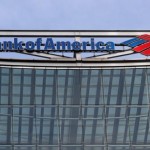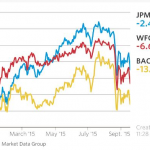Big Banks Agree to Settle Swaps Lawsuit

Dozen banks, Markit and International Swaps and Derivatives Association to pay combined $1.87 billion
Wall Street’s biggest banks have agreed to a tentative settlement over allegations that they conspired to rig the market for credit derivatives.
Twelve banks and two industry groups reached the preliminary agreement with plaintiffs in a civil lawsuit to pay $1.87 billion to settle the accusations, a milestone stemming from long-running probes into that corner of the financial system. Investigations by U.S. and European authorities into the credit-derivatives market are continuing.
The tentative settlement follows a wave of regulatory actions and private lawsuits that have alleged banks manipulated foreign-exchange and commodity markets as well as interest-rate benchmarks. Those cases have resulted in billions of dollars in fines.
The likely settlement is “an indication that this kind of behavior by Wall Street could be more far-reaching than we thought,” said Oliver Randall, assistant professor of finance at Emory University.
The lawsuit brought by a group of investors accused the banks, the International Swaps and Derivatives Association and data provider Markit Group Ltd. of colluding to block competing providers, including exchanges, from entering the market for derivatives called credit-default swaps.
Markets for these swaps, which are insurance-like contracts that compensate users for debt defaults, have long been dominated by big banks. The lawsuit centered on whether the defendants coordinated their efforts to delay or prevent exchanges from trying to put these credit derivatives onto open, regulated platforms where prices would be more transparent.
Trading the swaps on exchanges would have loosened the banks’ grip on a market that until recent years produced significant profits. At one point in 2011, banks made $55 billion, or 37% of their revenue, from swaps, according to a report by audit firm Deloitte.
In blocking the competition, the lawsuit argued, the defendants also cheated investors by obscuring what constituted fair prices. The plaintiffs’ complaint accused the defendants of holding secret monthly meetings in New York and elsewhere to thwart new entrants. The defendants previously denied the accusations contained in the lawsuit.
The defendant banks are: Bank of America Corp., Barclays PLC, BNP Paribas SA, Citigroup Inc., Credit Suisse Group AG, Deutsche Bank AG, Goldman Sachs Group Inc., HSBC Holdings PLC, J.P. Morgan Chase & Co., Morgan Stanley, Royal Bank of Scotland Group PLC and UBS Group AG.
Representatives for the banks and Markit declined to comment.
A spokesman for the International Swaps and Derivatives Association, or ISDA, said the group was “pleased the matter is close to resolution.” He said “ISDA remains committed to further developing [swaps] market structure to ensure the market functions safely and efficiently.” He declined to comment further. ISDA had previously said the allegations were without merit.
Credit-default swaps were blamed for playing a contributing role in the financial crisis, after American International Group Inc. sold swaps tied to soured mortgage bonds and received a $182 billion rescue by the government.
The credit-default-swaps market isn’t the revenue driver it was before the crisis. At the end of 2014, the Bank for International Settlements said the credit-default-swaps market was $16 trillion, down from $58 trillion at the end of 2007.
Daniel Brockett, partner at plaintiffs’ law firm Quinn Emanuel Urquhart & Sullivan LLP, said in an interview that it would take about 10 days or so to formalize the agreement. He announced the deal during a hearing in a federal district court in New York on Friday.
The settlement would constitute one of the largest recoveries ever in a private antitrust lawsuit, he said.
“We are pleased to have reached agreement on many of the important terms, including the amount of the settlement, but there are a few issues that remain to be discussed and negotiated,” he said in an interview following the hearing. The tentative settlement was reported earlier by Bloomberg News.
The plaintiffs in the lawsuit included the Los Angeles County Employees Retirement Association, Salix Capital U.S. Inc., Value Recovery Fund LLC and the Essex Regional Retirement System, court documents show.
Mr. Brockett declined to specify how the damages would be assigned or what the remaining sticking points were in the preliminary settlement. He said plaintiff lawyers took about 30 depositions from bank executives, Markit and the swaps association, but the evidence is under protective order.
As part of the agreement, ISDA may form a new committee to oversee how it licenses its proprietary information about credit-default swaps, according to people familiar with the matter. Because competing providers need such licenses to participate, the move may help open the market to new entrants.
The Justice Department confirmed in 2009 that it had opened a probe into the trading practices and clearing and information services supporting credit derivatives, but hasn’t brought any charges.
That investigation is continuing, but over time it has lost steam, in part because the Dodd-Frank financial-overhaul law, passed in 2010, introduced new rules for swaps.
European authorities are separately probing 13 investment banks, ISDA and Markit for anticompetitive practices in the credit-default-swaps market. In 2013, the European Commission accused them of acting collectively “to shut out exchanges from the market.”
Source: WSJ – Big Banks Agree to Settle Swaps Lawsuit



























